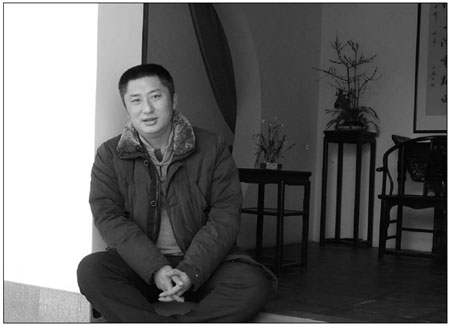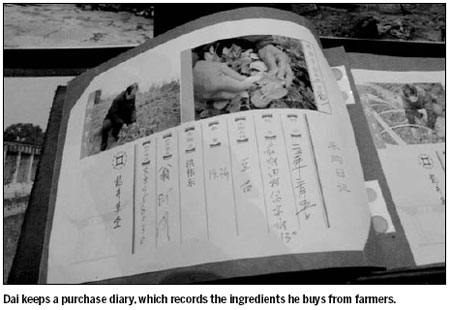|

Dai Jianjun has a restaurant near West Lake in Hangzhou and prepares dishes with ingredients that he guarantees are organic. Photos by Xu Junqian / China Daily
|

Fancy a plate of stir-fried veggies for 200 yuan? That's what it costs in a Hangzhou restaurant whose owner sources only organic ingredients from a loyal band of farmers. Xu Junqian reports.
With food safety becoming a national concern, a Zhejiang entrepreneur is raking in millions of yuan serving patrons of his rustic eatery near West Lake in Hangzhou dishes prepared with ingredients that he guarantees are organically grown.
Housed in a quaint building, Dai Jianjun's Longjing Manor, is named after the famous tea grown in the region.
The restaurant caters almost exclusively to a small number of loyal customers who share Dai's passion for natural foods and are willing to pay big bucks for it.
Dai and his team of buyers go to great lengths to scout for supplies from isolated farms around the region, where vegetables are grown and livestock raised the old fashioned way, free of chemicals and hormones. To ensure reliable supplies, Dai pays these farmers to adhere to his strict guidelines.
That explains why an ordinary dish of scrambled eggs with chives cost 200 yuan ($30) at Longjing, compared to 30 yuan ($4.5) at restaurants in downtown Shanghai.
Despite its location at one of China's most popular tourist attractions, Longjing Manor seems to have gone out of its way to make itself inconspicuous, with hardly a sign announcing its presence. It has just eight tables catering to no more than 80 guests at a time.
"The size of our business is constrained by the supply of ingredients that meet our specifications," Dai says.
He is coy about disclosing revenues but one of his managers confides that the restaurant and party-catering business grosses "millions" of yuan on average every year.
"We are not doing this just for a cause," the manager says. "This is a serious business for professionals."
In recognition of 42-year-old Dai's commitment to natural foods, Italy's Terra Madre - a network of food communities, each committed to sustainable agriculture and livestock breeding - awarded him a medal in November, 2010. He was commended for his contributions to the global "Slow Food" movement that aims to counter the spread of fast-food culture.
Dai is the first Chinese restaurateur to be so honored.
"We don't try to wow our customers with so-called grandma's recipes or flashy cooking. The only secret here is the preservation of the original taste of the raw ingredients," he says.
When Dai quit his cozy job as the manager of a State-owned resort in Hangzhou to pursue his dream of starting up his own restaurant in 2000, he found little support from family and friends.
But Dai persisted. It was also around this time that doctors told him he had diabetes, which he blamed on the junk food he ate in the resort's canteen.
"We are living in a toxic age and the only way to avoid being poisoned is to buy food directly from farms you trust," he says.
To ensure the integrity of his ingredients, Dai lavished more than 1 million yuan ($152.500) on his quest. He hired four experienced buyers (the number increasing to six with the boom in business), equipped each of them with a van, and sent them out into the remote and pristine countryside, to collect the best of the season's and region's produce.
He also recruited nearly 20 cooks, a number considered more suited for a restaurant with at least 30 tables, rather than his eight.
He wanted each of them to become familiar with age-old methods, like the production of home-pressed tea oil and cooking over wood-fired stoves.
At a time when the use of copious amounts of pesticides to grow vegetables, pumping livestock with hormones, and hatching eggs under artificial light rather than by hens, is common, sourcing natural ingredients was not easy.
The soil in most places is not fertile because of over-use, and farmers are extremely dependent on chemical fertilizers, says He Zhiping, one of Dai's first buyers to reach into the vast countryside of Zhejiang, one of the country's most industrialized provinces.
However, Dai didn't give up. He came up with a scheme to pay every farmer who agreed to abandon the "quick yield" approach, five to 10 times the average market price, so that they could allow sufficient time for the land to recover and the fowl to grow naturally.
To ensure supplies are authentic, buyers are required to bring back photos of the purchase trade, so he knows they have not come from some supermarket. After years of hard work, Dai says he now has more than 4,000 farmers who are his regular suppliers. They call the buyers whenever their hens lay their first eggs or they catch a mammoth carp from the river.
A meal at Longjing Manor will typically set one back 1,600 yuan. Also, there is no a la carte menu. Patrons make a call and say how much they are willing to spend, and the kitchen then sends out what comes within that budget.
The most expensive meal they have served cost 10,000 yuan, and included things like wild turtles and 10-year-old fungus, collected from deep in the lakes and mountains.
Dai admits that most guests are wealthy businessmen looking for novelty, and justifies his prices saying he is "robbing the rich to help the poor".
"Chinese farmers deserve better," he says.
"This is my way of telling people that you have to spend more in order to eat better.
"A simple plate of stir-fired vegetables costs 200 yuan. But it's expensive not only because you get to eat the most tender part of the greens, but also because you have to share the risk of storm or insect attack that the farmers face."
His eight tables are almost fully booked all year around. To keep his promise to "give back to the farmers", Dai has invested all profits from the restaurant in a plot of land on a secluded island to open a self-sustaining farm where schoolchildren can learn about where the food they eat comes from and realize that it is not the supermarket.
Located a three-hour car ride from Hangzhou and covering an area of less than 1 square kilometer deep in a valley, the farm is expected to become operational in April.
"I began my speech at Terra Madre with an ancient Chinese fable, that tells of a farmer who tries to help the shoots grow by pulling them up," Dai says.
"Everyone laughed on hearing this. But what I have been doing for the past decade is to prevent this from happening in real life."
(China Daily 03/23/2011 page20)
|


